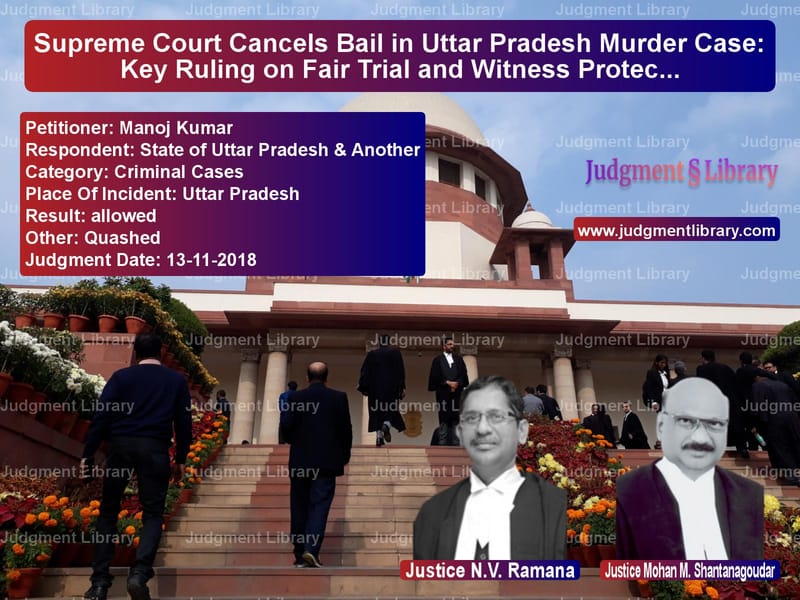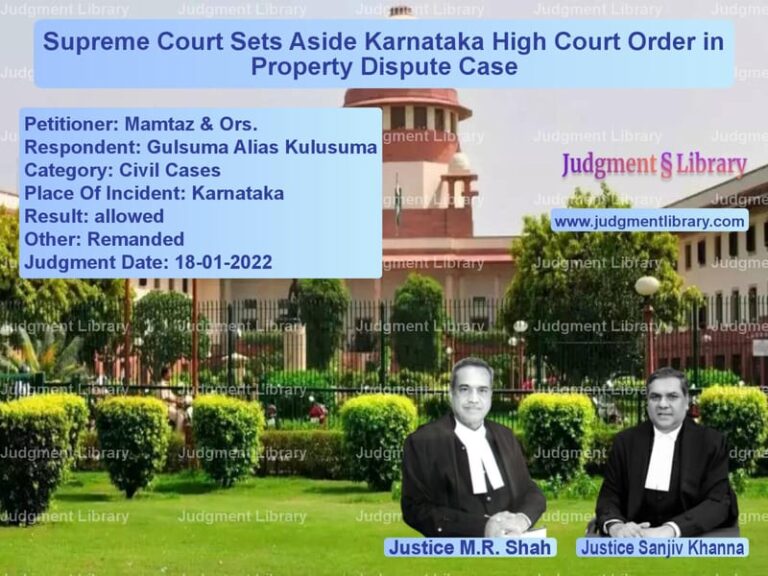Supreme Court Cancels Bail in Uttar Pradesh Murder Case: Key Ruling on Fair Trial and Witness Protection
The case of Manoj Kumar vs. State of Uttar Pradesh & Anr. centered around the granting of bail in a serious criminal case involving murder. The Supreme Court had to determine whether the bail granted by the Allahabad High Court was justified, given the nature of the offense and the risk posed to witnesses and the victim’s family.
The appellant, Manoj Kumar, challenged the High Court’s decision to grant bail to the accused (Respondent No. 2), who was charged under Section 302/34 of the Indian Penal Code (IPC) for the brutal murder of the victim. The Supreme Court’s ruling addressed crucial legal principles, including the responsibilities of the state in ensuring justice and the protection of witnesses.
Background of the Case
The case arose from an incident on the intervening night of September 7-8, 2016, when the accused, along with others, allegedly abducted the victim, Prashant, from his house at around 2:00 AM. The victim was taken away on a motorcycle under the pretext of an urgent matter. Later, he was brutally beaten and killed, with the perpetrators running a tractor over his body.
The prosecution alleged that the murder was motivated by financial disputes between the accused and the deceased. The First Information Report (FIR) was lodged on September 8, 2016, at 7:30 AM, detailing the incident and the involvement of Respondent No. 2. The post-mortem report revealed that the victim had suffered eight ante-mortem injuries and died due to shock and hemorrhage.
Arguments by the Petitioner (Manoj Kumar, Complainant)
- The High Court granted bail without considering the seriousness of the allegations and the strong evidentiary case against the accused.
- The accused had committed a brutal murder in the presence of eyewitnesses, and allowing him bail posed a direct threat to the complainant and his family.
- Since being released on bail, the accused had been threatening the complainant’s family to withdraw the case.
- There was a strong likelihood that the accused would influence witnesses and tamper with evidence if allowed to remain free.
- The trial was at a critical stage, and the accused’s presence outside custody could lead to a miscarriage of justice.
Arguments by the Respondents
- The defense supported the High Court’s decision, arguing that the accused had been granted bail based on legal principles.
- The accused had cooperated with the investigation and had not violated any bail conditions.
- The allegations of witness intimidation were baseless and should not be a ground for canceling bail.
Supreme Court’s Judgment
The Supreme Court found the High Court’s decision to grant bail deeply flawed and lacking proper justification. It ruled:
- The High Court had granted bail in a “casual manner” without assigning valid reasons.
- The accused had already been implicated in another case (Crime No. 512 of 2017) for threatening the complainant to withdraw the murder charges.
- The nature of the crime, the presence of eyewitnesses, and the potential threat to justice warranted the cancellation of bail.
- The state of Uttar Pradesh had failed in its duty to contest the bail application adequately, demonstrating negligence in handling the case.
- The trial court was directed to expedite proceedings and dispose of the case within six months.
The Court observed:
“The High Court, unfortunately, passed the impugned order in a casual way granting bail to the accused – respondent No.2 without assigning any valid and proper reason.”
Additionally, the Supreme Court criticized the Uttar Pradesh state government for failing to take effective steps in the case. The Court directed the Chief Secretary and Principal Secretary (Law) of the state to file affidavits outlining the measures they would take to prevent such negligence in the future.
Conclusion
This judgment underscores the importance of ensuring fair trials, particularly in serious criminal cases. The Supreme Court reaffirmed that courts must exercise caution when granting bail in murder cases, especially where there is a clear risk to witnesses and the complainant’s family.
The ruling also highlights the responsibility of the state in protecting victims and ensuring that accused persons do not use their liberty to interfere with the judicial process. The directive for the trial court to expedite proceedings further reinforces the judiciary’s commitment to timely justice.
With this verdict, the Supreme Court has set a precedent emphasizing that bail should not be granted mechanically and that judicial discretion must be exercised with due consideration for the rights of victims and the integrity of the trial process.
Petitioner Name: Manoj Kumar.Respondent Name: State of Uttar Pradesh & Another.Judgment By: Justice N.V. Ramana, Justice Mohan M. Shantanagoudar.Place Of Incident: Uttar Pradesh.Judgment Date: 13-11-2018.
Don’t miss out on the full details! Download the complete judgment in PDF format below and gain valuable insights instantly!
Download Judgment: Manoj Kumar vs State of Uttar Prade Supreme Court of India Judgment Dated 13-11-2018.pdf
Direct Downlaod Judgment: Direct downlaod this Judgment
See all petitions in Bail and Anticipatory Bail
See all petitions in Custodial Deaths and Police Misconduct
See all petitions in Attempt to Murder Cases
See all petitions in Judgment by N.V. Ramana
See all petitions in Judgment by Mohan M. Shantanagoudar
See all petitions in allowed
See all petitions in Quashed
See all petitions in supreme court of India judgments November 2018
See all petitions in 2018 judgments
See all posts in Criminal Cases Category
See all allowed petitions in Criminal Cases Category
See all Dismissed petitions in Criminal Cases Category
See all partially allowed petitions in Criminal Cases Category







